The CLL turns 25!
The CLL turns 25 this year! It feels like just yesterday we were celebrating our 20th anniversary! Where has the time gone? The old adage is true, time flies when you’re having fun! Of course a lot has happened since our 2018 celebrations. And this, all the while navigating a pandemic and a sharp transition into emergency remote teaching. Despite these unexpected events, and changes in staffing, the CLL continues to strive to achieve excellence in teaching and learning. We are most grateful for the dedication and vision of our founders and former directors: the then Campus Principal, Professor Compton Bourne, Dr Sylvia Moodie-Kublalsingh, Professor Beverly-Anne Carter and academic stalwarts such as, Dr Lancelot Cowie.
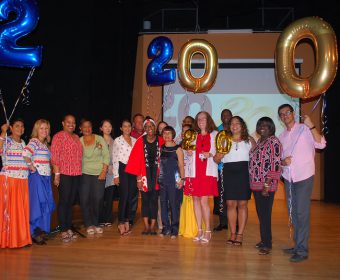
We are extremely indebted to a host of enthusiastic tutors who chose to make the CLL their home back in the late nineties. Nicole Taylor (French), David Assing (French), Alexis Figuera (Spanish), Anne-Marie Pouchet (Spanish), Gail Ganpat (Spanish), Renata Dowden (German), Kazuko Rankine (Japanese), and Sujata Chandra (Hindi), to name a few. Of course, the CLL’s academic thrust could not have been achieved without the administrative support of equally dedicated staff. We thank individuals such as Patricia Mannette, Nisha Mottilal, Nicole Dehere, Roopchand Choon, Evelyn Ruiz, Stella Marshall and Jaunita Edwards.
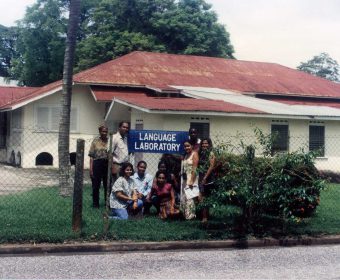
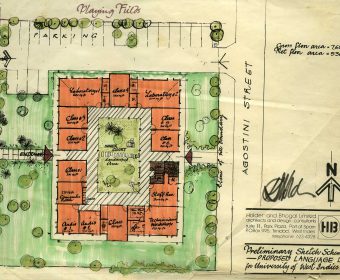







Our Achievements
What exactly is the significance of turning 25? In the regional, higher education sector, 25 years might seem miniscule. After all, the UWI celebrates its 75th anniversary this year. In 2021, the Faculty of Food and Agriculture celebrated 100 years of the region’s rich legacy in agriculture. Regardless, our silver anniversary offers us a time to reflect on our accomplishments, on our stakeholders and our future. Our 25th anniversary deserves to be celebrated with much pomp and fanfare. The CLL is the only university language centre in the Caribbean region. We have taught a diverse selection of non-specialist, foreign language courses, as well as English as a Second Language. These foreign languages include Arabic, Mandarin Chinese, French, German, Hindi, Italian, Korean, French Creole (Patois), Portuguese, Russian, Spanish and Yoruba. During the pandemic, we designed and began the delivery of the first blended, foreign-language courses for undergraduate UWI students in the region. Indeed, the CLL has come to be known as a unique, UWI institution that offers high-calibre courses and a fun, multicultural experience to all who enter its doors or join us remotely.
Regional and International Reach
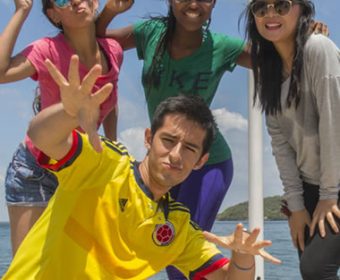
Of course, the multicultural experience we offer, cannot only be attributed to our foreign-born and highly-proficient, Trinbagonian-born tutors, but also our learners. Our students are of different nationalities, ages, and come from a wide variety of socio-economic backgrounds. Over the years, we have had learners from the Bahamas, Barbados, Botswana, Brazil, China, Colombia, Dominica, England, France, Germany, Iran, Japan, Martinique, Mexico, Russia, South Africa, St. Lucia, Papua New Guinea, Venezuela and more. Our reputation extends beyond our physical building and into the local and regional corporate sector. The CLL is the institution of choice for many corporate institutions seeking foreign language training for their staff.
We have had the esteemed privilege of teaching Spanish to all levels of staff at Caribbean Airlines, Central Bank, Citibank, Petrotrin and Nestle. In addition, we have also provided tuition for the Pan American Development Foundation (PADF), various local ministries such as the Ministry of Health, Ministry of National Security, and many others. Additionally, we have taught English as a Second Language to a cohort in Saudi Arabia, as well as, Business Spanish for Nestlé in Jamaica and Spanish for Specific Purposes for PADF in Aruba and Curaçao. The CLL thus continues to build on its legacy of academic excellence, underpinned by a spirit of entrepreneurship and relevance.
Anniversary Events: January – February
Now, what activities can you look forward to in this milestone year? Under the new directorship of Dr Nicole Roberts, we aim to continue in our trajectory of excellence. Therefore, we plan to celebrate our legacy with a series of cultural events around our foreign languages. The first of which, takes place on January 27, 2023. We invite all those interested in Hispanic culture to view the livestreamed book launch of our Founding Director, Dr Sylvia Moodie-Kulalsingh. The event is a celebration of the research and publications of Dr Sylvia Moodie-Kublalsingh and will highlight a trilogy on Trinidad Hispanic Culture. The books, Parang Cancionero, the Cocoa Panyols of Trinidad, and Maljo, Bush Teas and Secret Prayers are available for purchase on Amazon. The event promises to be insightful as the influence of Spanish culture on Trinidadian culture will be discussed.
The Languages for Life 2023 Competition will take place during the month of January. Secondary school students in forms 4 – 6, will be invited to reflect on the theme, Foreign Languages: A Gateway to the World. They will be encouraged to think about the personal, academic and professional opportunities that open up to persons competent in foreign languages. They will also think about how foreign languages help us navigate the world. Students will be able to present their thoughts via posters, short films, spoken word pieces or essays. The competition ends at midnight on February 27, 2023.
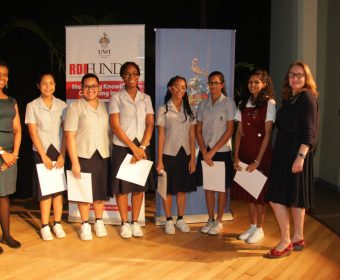
February – March
From February 27 to March 1, the Department of Modern Languages and Linguistics, (DMLL) UWI and the Centre for Education Programmes (Language and Literature Department), UTT in partnership with the Institute of Critical Thinking, UWI and the Centre for Language Learning, UWI, will engage in a collaborative outreach programme. This initiative seeks to raise foreign language teachers’ awareness of the role of the mother tongue and second/foreign languages in their classrooms. It will also inform and raise awareness among stakeholders of The UWI’s newly implemented Foreign Language Policy. The theme is, Every Teacher is a Language Teacher.
Undeniably, the highlight of our cultural activities this semester will be our triennial Open House! The theme for Open House 2023 is Explore the World with the CLL. As is customary, we look forward to welcoming our UWI community, members of the public and secondary school students on March 24 and 25 to the CLL. We hope, you will come prepared to engage in entertaining, cultural activities, play games, sample new foods, and expand your knowledge and understanding of other cultures. As this year’s Open House will also celebrate our 25th anniversary, we intend to take you along on an unforgettable journey with us! Never been to an Open House? View our 2018 Open House album here.
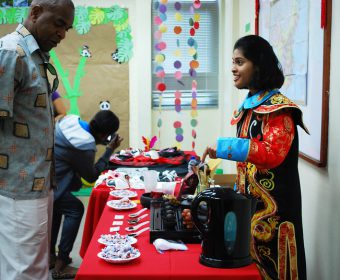
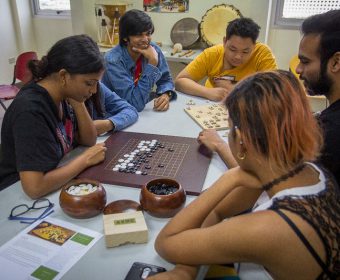
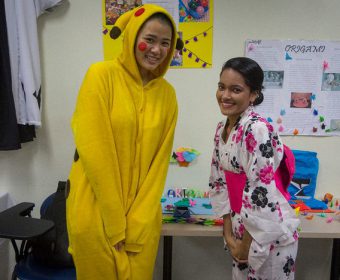
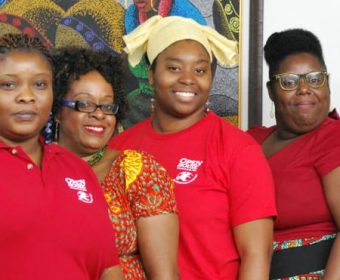
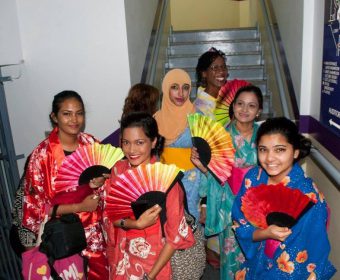






There’s so much more planned for this year, but we’ve already said so much. Our advice to you is to be sure to follow us on our social media platforms to keep up-to-date with our events. Like, subscribe and don’t forget to share with your friends and family. We look forward to an exciting year of activity with you!
Instagram: @centreforlanguagelearning | Facebook: @clluwista | Twitter: @clluwi | Flickr: @clluwista | YouTube: @clluwista
Holiday Traditions - Part Two
Germany
This entry continues to build on our December 15 post. You can view it here if you missed it. Today we start our exploration of cultures by looking at Germany.
In Germany, the holidays abound with a variety of traditions. One popular tradition is the laying of an Adventskranz (advent wreath). This wreath is decorated with four candles, representing the four advents or the four Sundays leading up to December 24. Every Sunday prior to Christmas Eve, a candle on the wreath is lit. The lighting of the first candle signifies the start of the Christmas season.

Once the Christmas festivities are over, Germans look forward to Silvester, named after the Catholic pope, Pope Silvester (314-335). This celebration takes place on New Year’s Eve. The New Year is rung in with sparkling wine and midnight fireworks. Another popular custom involves fortune-telling. Bleigiessen (lead pouring) is the ancient practice of predicting the future based on the shape of a piece of molten lead dropped into some cold water. Different shapes convey different meanings. For example, der Ball (a round, ball-like shape), means that good luck is on the horizon. der Anker (an anchor-like shape), means help in need, while das Kreuz (a cross-like shape) means death. Click here to view a video of this custom. Whether you have a chance to participate in this tradition or not, be sure to wish your German-speaking friends Frohe Festtage (Happy Holidays)!
Japanese
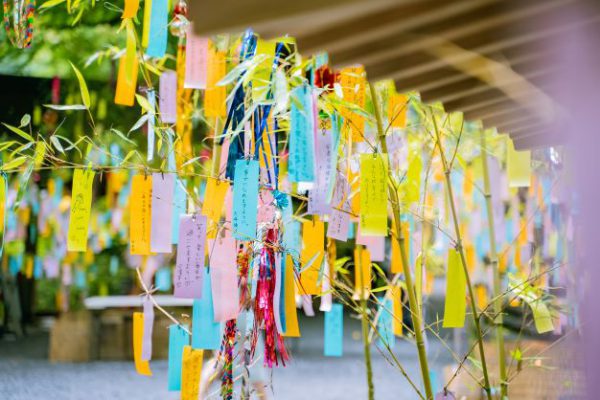
Like in other cultures, in Japan the holidays are synonymous with quality time spent with family. For the Japanese, Christmas Day is a special day for couples, while New Year’s is a big event to celebrate with family. One New Year’s Day tradition involves eating a special soup called, お雑煮 (おぞうにozouni). It contains rice cakes, chicken and vegetables like radish, carrots, green onions, etc. The origin of this dish dates back to the 16th century, believed to be a meal the Samurais ate while in battle. Today, most Japanese believe the rice cakes signify longevity since it yields quite a lot. Want to try making a traditional ozouni soup? Check out this video.
If you’ve only just started learning Japanese, then you may find these holiday greetings useful. よい お年を(yoi otoshi wo), which is said before New Year’s Day to wish someone best wishes in bringing in the new year. On or after New Year’s Day, the expression used is あけまして おめでとう ございます (akemashite omedetou gozaimasu), which means Happy New Year!
Portuguese
Unsurprisingly holiday traditions in neighbouring Brazil also revolve around food. Like the local tradition of eating black eye peas, Brazilians eat lentils on New Year’s day. In their culture, lentil peas represent prosperity. Brazilians believe that people who eat lentils before any other dish on New Year’s Day will have a prosperous year. Our avid beach-goers may find this second tradition particularly appealing. Another popular holiday tradition in Brazil involves going to the seaside on New Year’s Eve. Brazilians try to jump seven waves, expressing a wish or gratitude with each jump. They believe this will help them more successfully accomplish their goals in the coming year. For more traditions check out this short article. Now, if you’ll be visiting our Portuguese-speaking neighbours in the coming weeks, you may find these holiday expressions useful: Feliz Natal (Merry Christmas) and Boas Festas (Happy Holidays).

Spanish
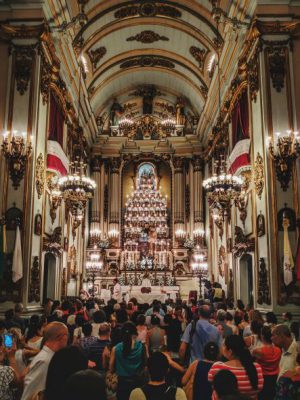
Most Trinbagonians are familiar with the vestiges of Spanish culture gifted to us by our Venezuelan neighbours. But what about our other Spanish-speaking neighbours? For the foodies among us, the holiday festivities in Colombia and Ecuador may be particularly appealing. In both countries, the main event takes place on La Noche Buena (Christmas Eve). The Ecuadorian festive dinner usually includes stuffed turkey or roasted chicken. Some hornado de chancho (roasted pork leg, which is marinated in garlic and beer) is another popular dish. Regardless of the choice of protein, sides of rice, potatoes, salads, tamales and buñuelos are the norm. Typical beverages include wine or chichi (fermented corn beer). Once dinner is over, Ecuadorians attend misa de gallo (midnight mass) and end the night partying with friends and family. In Colombia, December 24th marks the end of the novena de aguinaldos (a nine-day religious ceremony). For the Catholic community, in Colombia, Ecuador and Venezuela, this 9-day period is a time for family and friends to get together to pray, eat and sing villancicos.
Like Ecuadorians, Colombians too, eat buñuelos around this time, but prefer to drink sabajón (a Colombian style eggnog) and hot chocolate. In both cultures, the infant Jesus is placed in the manger at midnight on Christmas Eve. Only then do they exchange gifts. So, if you plan to meet up with any native Colombians or Ecuadorians living in Trinidad or Tobago, remember to wish them Feliz Navidad and Prospero Año, especially on December 24th.
Yoruba
In one of our previous entries, we mentioned that Yoruba-speakers live in many different parts of the world. For example, Brazil, Cuba, Ghana, the Republic of Benin, Sierra Leone, and Togo, and Trinidad and Tobago. Like the Chinese, for Yoruba-speakers the holidays represent an opportunity to return to their hometowns to spend time with their family. Regardless of one’s system of beliefs, the holidays are a time to exchange gifts, cook special dishes and do some shopping. Some of the most popular dishes to enjoy during this time are, jollof rice, moinmoin, nkwobi, chicken stew, coleslaw, amala gbegiri and ewedu, ikokore, iyan and obe egusi. Some popular Yoruba greetings during the holidays are, Ẹ kú ìsimi (Enjoy your rest, since the holidays are a time to rest) Odun Aya abo (May the year bring you growth, development opportunities and blessings), and Ẹ kú Ọdún Ọdún àyabo (Happy New Year).

Interested in learning more about the cultures of the languages taught at the CLL? We will be happy to help you broaden your cultural understanding of others. Beginning in January 2023, our course offerings will include, Arabic, Mandarin Chinese, French, German, Japanese, Portuguese, Spanish and Yoruba. We will also continue to offer courses in English as a Second Language for speakers of languages other than English. Classes will be delivered either face-to-face or remotely via Zoom. Registration begins on January 3, 2023. For more information visit our website: Non-University Students | UWI STA Centre for Language Learning or email us: cll.fhe[@]sta.uwi.edu.
Holiday Traditions - Part One
Recently we found ourselves discussing local holiday traditions. Surprisingly we found it a bit challenging to identify uniquely Trinbagonian traditions. Perhaps because we identify more with modern traditions? Or perhaps it was a case of instant amnesia when faced with such a simple question? Whatever the reason, we eventually remembered the tradition of eating black eyed peas and rice to bring in the New Year. Can you think of any others? Well given our regrettable lapse in memory, we decided it would be interesting to identify and compare a few holiday traditions for each of our taught languages. It may well surprise you to see the similarities between traditions regardless of language or culture.
Arabic
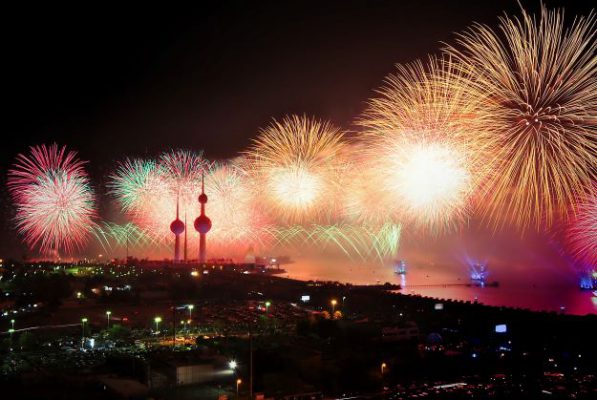
Christmas and New Year’s might not immediately come to mind when thinking about holiday traditions in the Arabic-speaking world. Truthfully, while many Arabic-speakers practice Islam, there are also those who practice Christianity, as well some who are more secular-minded. In fact, in 2018, the National Geographic listed Beirut, Lebanon, as the seventh city in their list of Top 10 New Year’s Eve celebrations. In Lebanon, New Year’s Eve is a festive time. People flock to Nejmeh Square, in the capital, to watch the amazing fireworks display. It is also not uncommon to see people decorating their homes, businesses and streets with holiday decorations. In Iraq, Christmas Day is celebrated in a more traditional fashion.
It is customary for families to read the account of Jesus’ birth from the Bible (in Arabic). Everyone listening to the reading, holds a candle which, following the reading, is used to light a bonfire. A pile of dried thorns is added to the bonfire. Once completely burnt the family members take turns jumping over the ashes as they make their wishes.
Mandarin Chinese
Do not quickly conclude that the Chinese do not observe holiday traditions with as much vigour as the rest of the world. Historically, the Chinese do not observe Christmas, though a modern trend has been to gift apples to wish peace on the recipient. The most important holiday, though, is the Chinese Spring Festival, or the Chinese New Year. It celebrates the end of winter and the coming warmth of spring, according to the Chinese Lunar Calendar. These 16 days (January 21 – Feb 5, 2023) of festivities are marked by house cleaning and putting up red lantern decorations. People also visit their friends and family, and eat dumplings. The festivities culminate with the Lantern Festival. During this time, children look forward to receiving monetary gifts in red envelopes, called 红包 (hóng bāo).
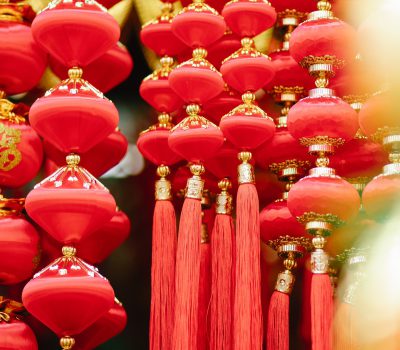
Like in many other cultures, this is a time for family, reflection and planning for the future. Many Chinese make a concerted effort to return to their hometowns, regardless of the distance. So if you have the chance to engage with the Chinese-speaking community locally or during your travels, be sure to wish them: 春节快乐 (chūnjié kuàilè) (Happy Spring Festival)! and “新年快乐 (xīnnián kuàilè) (Happy New Year)!
English

In the English-speaking world, holiday traditions are somewhat similar. They centre around food, putting up decorations, gift-giving, spending time with family and friends. And for the religiously-inclined, attending church services. In Canada and the United Kingdom though, there is one particular holiday tradition that is not for the faint at heart. Some Canadians and Brits do a polar bear swim, in which they dress up in silly costumes and jump into the winter sea for charity. While in Canada this custom shifted from a Christmas Day to New Year’s Day event, in the UK, some people brave the chilly seas on Christmas Day, Boxing Day and New Year’s! Interestingly, in South Africa, the holiday season falls during their summer time. So unlike other cultures, their festive season is naturally vibrant and colourful, and involves a lot of outdoor activities.
Schools and many businesses close for the entire month of December, allowing families to plans trips to the beach and to go camping. Rather than a traditional Christmas dinner, South Africans look forward to Christmas lunch, which takes the form of an outdoor barbecue. It is common for their spread to include turkey, duck, roast beef along with mince pies, yellow rice, raisins, and vegetables. And what’s a Christmas lunch without dessert? Christmas plum pudding, crackers and the traditional malva pudding are the norm. If English is not your first language, then these greetings will be useful to you internationally, Merry Christmas, Happy Holidays and Happy New Year!
French
For the French, both in metropolitan France and francophone countries, the holidays are a time for family, friends, food and a plethora of quaint traditions. Weeks before Christmas Day, people in the French West Indies and French Guyana participate in Chanté Nwel (carolling). They sing carols in Creole and French, play drums, dance, eat and drink together. In metropolitan France, Christmas markets are very popular. The fast-paced city life slows somewhat as people visit the markets to buy artisanal gifts, eat châtaignes grillées (roasted chestnuts) and drink du vin chaud (spiced, mulled wine).
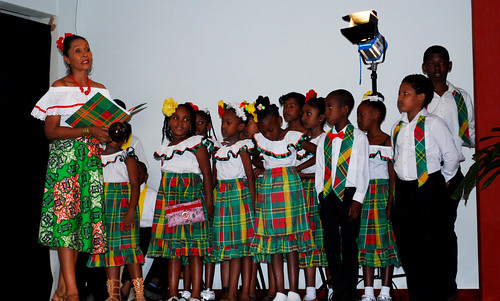
Le Réveillon (Christmas Eve) is the main event during the holidays. Families get together for a long dinner around a decorated table. Among the delicacies at this time are smoked salmon, oysters, foie gras (liver paté), turkey with chestnuts, cheese platters, salad and, for dessert, the traditional chocolate log, la bûche de Noël. Check out this video to learn more about Christmas in France. Don’t know how to say Merry Christmas or Happy Holidays in French? Try Joyeux Noël or Bonnes fêtes!
These holiday traditions across cultures are fascinating, don’t you think? In part two, we will explore our other taught languages. Interested in learning more about the cultures of the languages taught at the CLL? We will be happy to help you broaden your cultural understanding of others. Beginning in January 2023, our course offerings will include, Arabic, Mandarin Chinese, French, German, Japanese, Portuguese, Spanish and Yoruba. We will also continue to offer courses in English as a Second Language for speakers of languages other than English. Classes will be delivered either face-to-face or remotely via Zoom. Registration begins on January 3, 2023. For more information visit our website: Non-University Students | UWI STA Centre for Language Learning or email us: cll.fhe[@]sta.uwi.edu.
The Centre for Language Learning
The University of the West Indies
St. Augustine
Trinidad and Tobago
E-mail: CLL.FHE@sta.uwi.edu
Tel: (868) 662-2002 ext. 82524
Copyright © 2012-2025 |







